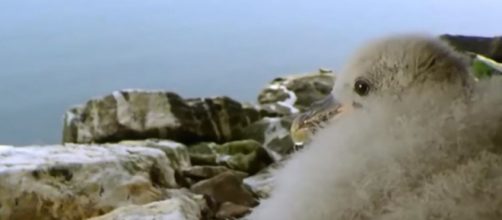Fulmar chicks repel predators in an unusual way and predators who think to snack on them regret it instantly. In fact, their defense mechanism is disturbing as they do this by projectile-vomiting. And it's not your usual bit of harmless baby puke either. For feathered predators, the result of meddling with the chicks of these seabirds can lead them to their deaths.
Fulmar chicks look cute and cuddly
The young seabirds' parents raise their babies on the walls and ledges of cliffs and in rocky overhangs. Sometimes they may become inventive and actually scrape a bit of a depression or adorn the nest with a piece of seaweed.
However, the birds don't overly concern themselves with housekeeping, probably because they only return to land for breeding.
Oceanwide Expeditions explain on their website, that the birds are pelagic, which means they "live entirely at sea." Their single egg usually hatches after the parents take turns to keep it warm for about 50 days. The chicks look cute and cuddly while the parents feed them, but you won't want to get too close to them as they vomit a disgusting sticky, oily mixture that stinks to high heaven.
By the time the Fulmar chicks grow their feathers and fly away with the rest of the flock, their dangerous period is over. But for unwary seabird predators, untold numbers of them die after an encounter with the gull-like bird.
The very word Fulmar means "foul gull." Actually, while they look like gulls, they are not, and the species are related to the petrel family. The birds come equipped with a part of their stomachs called a proventriculus. Here, they manufacture and store a disgusting, stinking, foul and revolting oil. Predators like rats, squirrels, and foxes will get a face full of it and be instantly put off chowing down on a chick.
Death vomit for predatory birds
For the predatory sheathbills and skuas, they don't just go home stinking like a hellish garbage dump. The oil can mean death. The deadly oil projectile-vomited on them covers their feathers and simply won't come off. Mens Den.com noted that the oil "glues the feathers together." Glued feathers mean they don't work and the birds can plummet to their deaths.
If the birds try and wash it off in the sea, they discover that buoyancy is gone and they drown. Predatory seabirds only get one shot at learning the fatal lesson.
Obviously, the projectile defense mechanism works as the birds breed successfully, although the Northern Fulmars far outnumber their Southern cousins. The deadly Fulmar chicks are found in the North Atlantic, the North Pacific, and in the Southern Ocean. However, they still face predation after they leave the nests - from humans. When they fall from the nests, and they are unable to fly yet, the Faeroese people hunt them for food every August.


